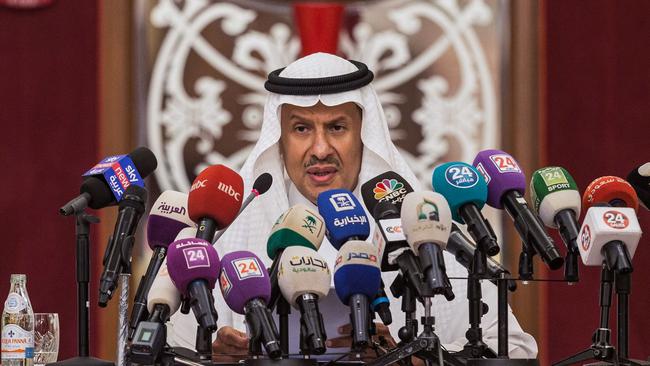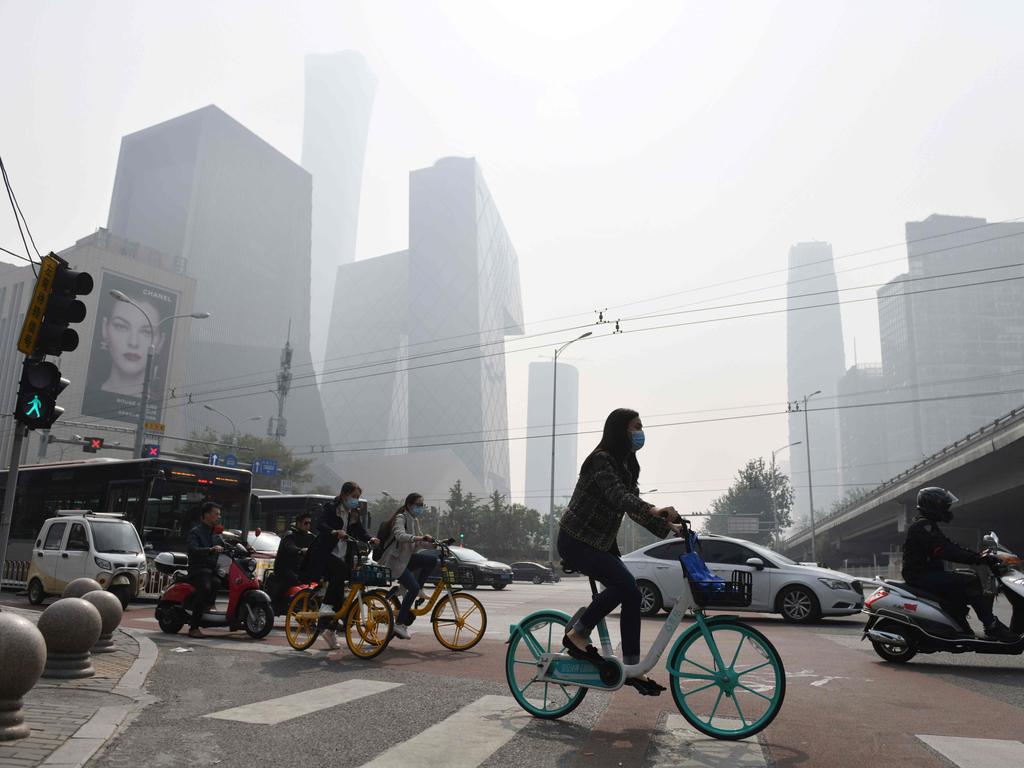Saudi Arabia pledges ‘net zero’ carbon emissions by 2060
Goal doesn’t include emissions from the massive amounts of oil the kingdom exports to other countries.

Saudi Arabia pledged to reduce its net carbon emissions to zero by 2060 ahead of a United Nations climate summit next weekend, as one of the world’s top oil producers resists calls to cut investment in new oil and gas development.
The kingdom plans to cut carbon emissions by over 270 million tons a year, Crown Prince Mohammed bin Salman said Saturday in a prerecorded address to a climate forum in Riyadh. Saudi Arabia is set to invest more than $186 billion to achieve that goal, he said.
The Saudi target is less ambitious than those of the International Energy Agency, a group representing industrialised energy consumers, and the U.K.-led COP26 climate-talks presidency, which are both recommending reaching net-zero emissions by 2050.
It also doesn’t include emissions from the massive amounts of oil Saudi Arabia exports around the world for energy use by countries like China and India. The kingdom pumps about one in 10 barrels of oil consumed each day in the world.
“The world’s largest oil exporter becoming a net-zero economy, the optics of it look strange,” said Ben Cahill, senior fellow at the Center for Strategic and International Studies. “These two things are not mutually exclusive: You can both decarbonise your oil and gas production and reduce economywide carbon emissions, and still be a really large oil and gas exporter.” The Saudi economy remains heavily dependent on revenue from oil and gas sales, despite an aggressive public campaign to diversify away from fossil fuel. More recently, Riyadh has redoubled its commitment to those exports, investing to produce even more crude.
Saudi Arabia is also pushing fellow oil producers to present a united front and oppose rising calls for a reduction in fossil-fuel investment ahead of the COP26 summit that kicks off Oct. 31 in Glasgow, Scotland.
Saudi Energy Minister Prince Abdulaziz bin Salman has argued that the IEA’s 2050 target would reduce supply before global demand drops significantly, risking an oil price superspike and unfairly burdening economies that are overly dependent on importing or exporting oil and gas.
Oil-producing countries have emerged as a formidable group that is resisting what they describe as an unrealistic push by rich nations to limit fossil-fuel investment as a way of lowering greenhouse-gas emissions.
Saudi Arabia has told global oil industry executives and international investors that it is committed to investing in its oilfields to expand production and has no plans to curb such spending, according to people familiar with its position.
On Saturday, Prince Abdulaziz said Saudi Arabia may hit the emissions target ahead of 2060 but it chose that year because U.N. experts expect that most climate technologies won’t mature before 2040.
“We need to have that time and that space to allow us to do this properly,” Prince Abdulaziz said. “The 2060 (target) will enable us to have a smooth and viable transition without risking economic or social impacts.” Robin Mills, chief executive of Dubai-based consulting firm Qamar Energy, said the 2060 target was reasonable for Saudi Arabia given the challenge it faces as one of the world’s top oil exporters. “It gives them the moral upper ground: We are now part of the solution, not the problem,” he said.
Saudi Arabia is the highest emitter of carbon dioxide on a per capita basis among the Group of 20 countries, according to the European Commission’s Joint Research Centre.
Prince Abdulaziz said the kingdom would meet domestic energy needs by shifting to 50% renewable sources, and plans to reduce 90 million tons of CO2 a year by focusing on industry, transportation and building. These three sectors constitute 90% of Saudi Arabia’s energy intake.
Separately, Amin Nasser, chief executive of Saudi Aramco, said Saturday that the state-owned oil giant would “achieve an ambition of being also net zero from our operations by 2050.” He said details would be released next year.
Aramco is currently working on a plan to hike its production capacity from 12 million barrels a day to 13 million barrels over the next six years. Mr. Nasser said the energy transition would be long and complex, and huge investment was needed now in order to expand oil and gas capacity to meet growing demand as the world emerges from the pandemic.
“Otherwise, you will end up with a global economic crisis,” he told reporters. “Decarbonising the economy is not going to help anyone.” The IEA, a group that monitors energy issues and whose members include much of the developed world, said in May that governments and companies should immediately cease investment in new oil and gas development if the world wants to achieve net-zero carbon emissions by 2050.
The kingdom joins China and Russia – respectively the world’s biggest oil importer and second-biggest crude producer – who have set 2060 as their target, complicating attempts to reach a consensus at the COP26 summit.
Alok Sharma, the British cabinet minister who is chairing the Glasgow meeting, has repeatedly said he plans to use the IEA’s net-zero emissions target as a template for the talks.
On Saturday, Mr. Sharma welcomed Saudi Arabia’s emissions pledge. “I hope this landmark announcement at [Saudi Green Initiative] Forum will galvanise ambition from others ahead of COP26,” he tweeted. “Look forward to the detail of Saudi Arabia’s revised NDC and working together to keep 1.5C in reach.” Some environmental groups criticised governments’ net-zero targets as not going far enough to slow climate change.
A spokeswoman for Friends of the Earth said pledges by Saudi Arabia and others “will certainly not keep global temperature rise to below 1.5 degrees.” Instead, she said, it will “allow them to keep emitting greenhouse gases, on the premise of paying to offset them elsewhere.”
Benoit Faucon contributed to this article.
The Wall Street Journal




To join the conversation, please log in. Don't have an account? Register
Join the conversation, you are commenting as Logout